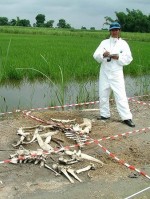
A “body farm” is a facility for research on decomposing bodies. It can also be a training ground for criminal investigators. The fifth body farm in the US is preparing to open in Pennsylvania, which will give researchers a new environment to study.
“It’s so environment specific,” said Dr. Richard L. Jantz, Professor Emeritus and Director of the Forensic Anthropology Center at the University of Tennessee. “In east Tennessee, it’s not humid in the summer and it doesn’t get that cold, but in the southwest, it’s hot and dry all the time and things proceed differently.”
Cold weather generally slows the rate of decomposition, while heat, direct sunlight, and high humidity all accelerate it. A buried body, exposed to fewer elements, will decompose more slowly than one on the surface, but acidic soil and high soil moisture can work to speed up the process. The California University of Pennsylvania body farm, to be located in the southwestern corner of the state in a humid continental climate, will be subject to hot, humid summers (with an occasional heatwave); cold, snowy winters; and regular precipitation throughout the year. These climatic conditions, distinct from those in Texas, North Carolina and Tennessee, will likely affect corpses in undocumented ways and provide ample opportunity for new research.
Over 100 people each year donate their bodies for research on the farms. Read more about body farms at The
Atlantic.
 A “body farm” is a facility for research on decomposing bodies. It can also be a training ground for criminal investigators. The fifth body farm in the US is preparing to open in Pennsylvania, which will give researchers a new environment to study.
A “body farm” is a facility for research on decomposing bodies. It can also be a training ground for criminal investigators. The fifth body farm in the US is preparing to open in Pennsylvania, which will give researchers a new environment to study.
No comments:
Post a Comment